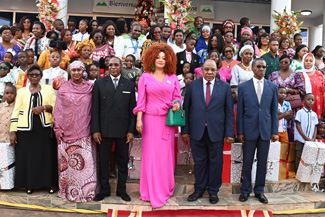In its efforts to build a competitive and prosperous economy through the development of investment and savings, and performance objectives of its economic and social action, the Republic of Cameroon has set the following guidelines:
- The reaffirmation of the choice of the economy to walk as mode of privileged economic organisation;
- The reaffirmation of the essential role of the State for the promotion of social and economic development;
- The acknowledgement of the entrepreneur’s, investors and private company's key role as crucial factors of creation of wealth and jobs must be subject to particular attention from, not only the whole State machinery, but also from the entire society;
- The pledge to preserve the freedom of enterprise and the freedom of investment;
- The commitment to maintain a secure macroeconomic framework;
- The pledge to ensure flexibility and reversibility of decision making processes in the sense of building the competitiveness of the economy;
- The clarification of the role of the state and institutions in terms of economic and social issues, as collective actors seeking full employment of national resources through appropriate actions and taking into account the strengths and weaknesses of the market, the private sector and the civil society in a bid to ensure a State of law and good governance;
- The re-centring and building of the role of the university and national scientific and technical research system as critical factors of transformation and mastery of economic and social structures;
- The promotion 6f entrepreneurship as bock bone of valorisation of the potential of creativity of Cameroon, a prior condition for the creation of viable and competitive companies and determinant factor to solve sustainably the problem of unemployment and poverty;
- The safeguard of the ecological environment and rational exploitation of natural resources of the soil and sub soil to develop safe and sustainable development;
- The promotion and active facilitation of investments and exploitations in coherence with the valorisation of the entrepreneurial potential;
- The taking into account of specific or particular sectors which need measures, mindful of constraints tied to conditions of exploitation and valuing of local resources;
- The preoccupation to establish an appropriate institutional and regulatory framework that guarantees security of investment, support to investors and equitable rapid settlement of disputes on investment and commercial and industrial activities;
- The necessity to dispose of an adequate financial system that enables a efficient financial intermediation and in particular, ensure a good mobilisation of saving and its orientation towards most productive activities and towards high yield investments;
- The interest to have a trust worthy and efficient information system using new information and communication technologies;
- The pledge to make effective every necessary measure recommended by coordination and supervision organs created by this law to create type charter of investment in the republic of Cameroon;
- The pledge to promote a real partnership between the State, private sector and the civil society as condition for the search of a better global efficiency of the economy;
- The putting in place of an inciting and attractive law for investors which shall take into account, on one hand, the specificity and imposition of production equipment and, on the other hand, demands of competitiveness to exportation.
DEFINITION
In considered as investor according to this law, every physical or corporate body From Cameroonian or foreign origin, resident or not, who acquires an asset for the exercise of its activities in view of obtaining yields.
Is considered as investment, according to this law, an asset held by an investor, in particular:
- A company
- Shares, parts 01 the capital or other participations to capital of a company
- Obligations and other forms of claims
- Monetary claims
- Intellectual property rights
- Rights to medium and long term contracts, notably management, production, commercialisation contracts
- Rights given by law and regulations to concessions, licences, authorisations or permits
- Every other corporeal and non corporeal property, movable or immovable, all related property rights.























